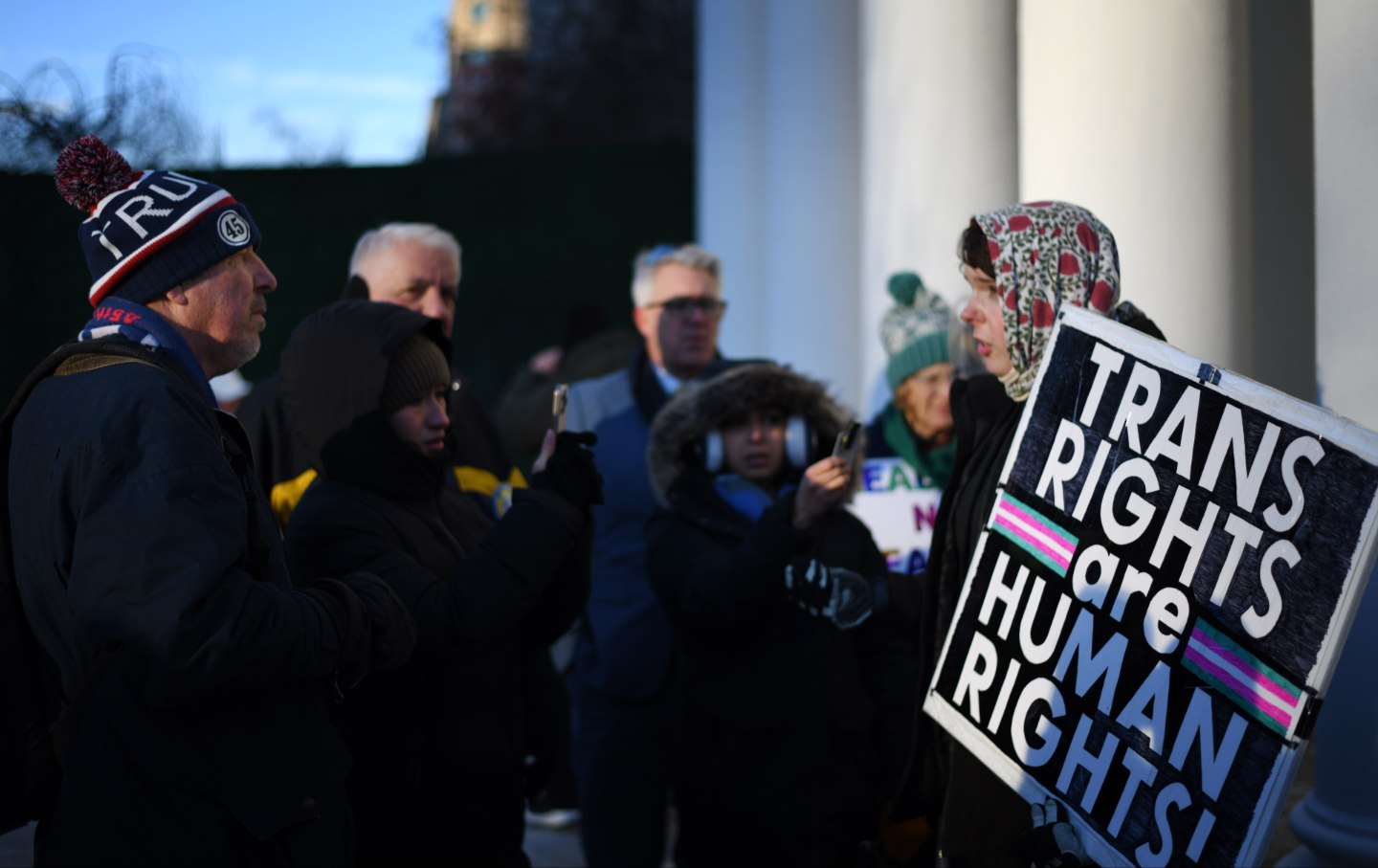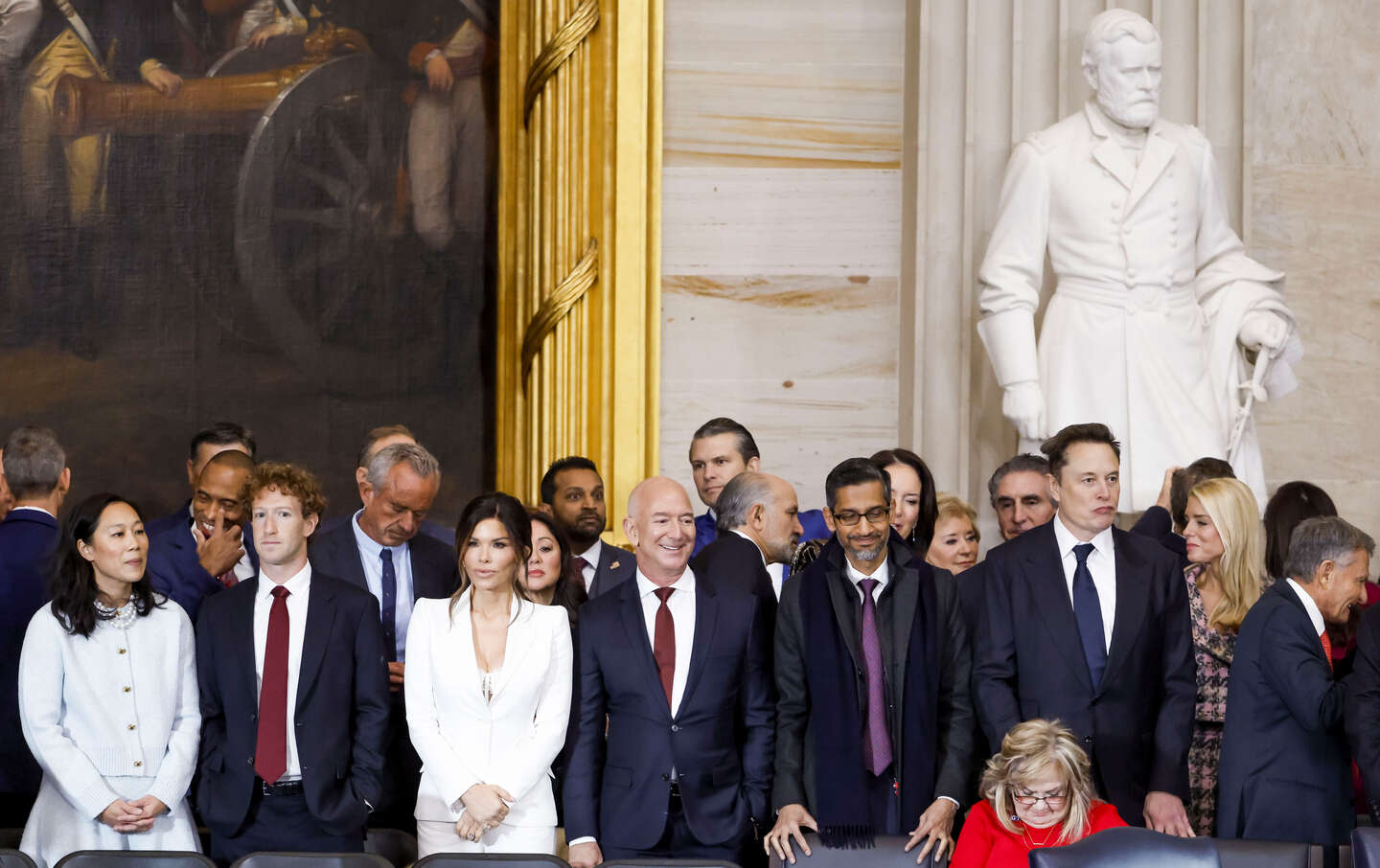The Right to Pee Is Everything
Trans peoples’ basic right to exist in the world is under assault. Bathrooms are at the heart of that fight.

Trans rights activists and President Trump supporters near the White House on January 20, 2025.
(Astrid Riecken / The Washington Post via Getty Images)The first time I encountered the idea of “bathroom bills” was in college. I was a young opinion writer at my student newspaper and, since I was out as trans, I was asked by my editor to write a short op-ed about the burgeoning efforts to bar trans people from the bathrooms that matched their gender identity. Next to my column, an opposing piece by a young Republican was to be printed.
Back then, it seemed like everyone was on my side. The common refrain was that we shouldn’t deny trans people the ability to use such crucial, public facilities. North Carolina’s notorious HB 2 bill was widely unpopular at the time (even Dolly Parton came out against it) and proved to be a political disaster for its chief backer, Republican Governor Pat McCrory. Even then-first-time presidential candidate Donald Trump went back and forth.
My op-ed opponent’s piece reflected this existing civil détente. He avoided blatant anti-trans sentiments, instead reaching for vague arguments about free speech, religious exemptions, and the economy.
How times have changed. Now there’s no need for an opponent to shroud his bigotry in jargon. Hatred of trans people is too commonplace for that sort of obfuscation.
In the past few years, an anti-trans agenda has exploded nationwide, with widespread attempts to deny trans people access to hormones, surgery, sports, and even the basic ability to move unhindered in public. The panic has reached the Supreme Court, where trans lawyer Chase Strangio fought to protect the rights of children who wish to transition. Even many self-proclaimed liberals like Pamela Paul argue against the existence of trans children, as do some Democratic representatives.
Donald Trump’s return to the White House has turbocharged this assault. Trump has already issued a blizzard of anti-trans executive orders, all of which seek to strip us of our basic rights in one way or another.
One order attempts to deny trans people—particularly trans women—the right to change the gender markers on their passports (a directive that is already throwing trans peoples’ ability to travel into disarray). The order also seeks to “Defend Women from Ideological Extremism” by moving trans women into men’s prisons and forcing the US to define sex and gender as either male or female. Another order targets gender-affirming care for children across the country as well as any federal funding used to support trans healthcare. If it’s upheld, my Medicaid will no longer pay for my estrogen.
Every trans person I talk to is feeling the weight of this, even if they were already bracing for Trump 2.0. And far too many cis people and news outlets seem to be ignoring this onslaught. Leading Democrats appear to have all but stopped caring, but even leftists online seem less interested in posting cutesy pro-trans infographics. (If I sound bitter, I am.)
Beyond ramping up the climate of fear and bigotry, this policing of both public and private spaces will have a chilling effect on how trans people move through the world. And that brings me back to bathrooms.
Like clockwork, bathrooms are once again at the heart of the anti-trans campaign—most notably with the successful attempt by House Republicans to ban Sarah McBride, the first openly trans member of Congress, from using the women’s bathroom in her own workplace. (McBride, in a concession to this far-right campaign, quietly acceded to the ban rather than protest the move.)
Bathrooms are only one way of attacking trans bodily autonomy. But it’s not only trans people that are affected by such legislation. Bathrooms have a storied history of being politicized to wage war against the dignity and social agency of minoritized subjects. We must not capitulate to this latest attack on bodily autonomy. Backing down is always a losing strategy, and a good offense can be a good defense.
The ability to be in and of the world requires the ability to use the bathroom. Flippant and scatological as such a concept is, everyone does shit and everyone does pee. So it’s no accident that the right to use the bathroom is constantly weaponized against marginalized populations—whether that’s trans people, people with disabilities, people of color, or unhoused people.
There’s a lack of accessible, free bathrooms even in major cities like New York. The right to pee is almost entirely privatized in our modern, industrialized country. When those rights are at the whims of wealthy corporations, they can easily be removed at will. Take Starbucks, which recently decided to revoke public access to its bathrooms—access that was granted after the racist arrest of two Black men at a Philadelphia location in 2018. Everyone has probably ducked gratefully into a Starbucks bathroom at some point in their lives; now, that privilege will be limited to those who can pay.
The attempts to police trans bathroom use cut across all of these boundaries. The way we fight for (and against) bathrooms affects not just how we fight for dignity in this one area, but for the whole panoply of trans issues. If one is a specter, a ghoul incapable of using public space, one is much easier to banish to the margins. To sentence someone to dwell only in the private world is to accuse them of being a pervert rather than a human.
We must fight for rights without engaging in a debate about essential personhood. We’ve already tried using such truisms. Trans people are beautiful, trans rights are human rights, trans kids are kids, trans people exist. These are inane statements of fact, not catchy political idioms or meaningful calls to action. They are defensive positions rather than full-throated attacks on transphobic vitriol. Feeling valid isn’t the point. Having basic civil rights and access to healthcare is.
The history of bathroom segregation and politicization can be traced back centuries. Along with the right to vote, the suffrage movement fought for women (well, cis women) to have access to their own public toilets. Bathrooms were also a core feature of Jim Crow bigotry, with facilities divided between men, women, and “colored” people. Here Black men and women were denied gender-specific facilities, simultaneously conflated and ungendered. While the comparison between cis-only bathrooms and whites-only bathrooms doesn’t fully cohere, the struggles are certainly interconnected; there’s a clear racialization to how sex is constructed in the public eye, as C. Riley Snorton has chronicled in Black on Both Sides, a history that dives into the degendering of Black women. Meanwhile, Black civil rights groups like the NAACP have fought in support of trans rights over the years.
During the 1970s, opponents of the Equal Rights Amendment used fears that it would mandate unisex toilets to aid their successful campaign to tank the law. Bathroom issues continued during the ’80s and ’90s during the HIV/AIDS epidemic, when some wanted gay men to be banned from public facilities. Queers, like trans people, weren’t considered family-friendly. They were seen as potential groomers or vectors of disease.
There were gains interspersed within these cycles of backlash. The Architectural Barriers Act of 1968 and the Disabilities Act of 1990 mandated that bathrooms be made accessible towards people with disabilities. And by 2016, there seemed to be enough of a consensus around bathroom access that standing up for trans people’s right to pee was a mainstream position.
So how did we get to where we are now? Wedge issues, of course. Transness became a part of the anti-woke culture war, with children used as the ultimate cudgel. Right-wingers and TERFs alike began to decry the loss of innocent children and the unfairness of trans women competing in sports. The appeals to children–especially in competitive sports—hit an emotional note. Conservative think tanks pounced and started seeding hateful legislation around the country. And after winning cases surrounding sports (recently the House passed a bill to ban trans athletes from female sports teams), they circled back to bathrooms and hormones.
Currently, 14 states have bans against trans people using bathrooms that match their gender, including Montana, Florida, Utah, and, yes, North Carolina. When McBride was elected, Representative Nancy Mace threw a fit and passed a bill to deny her the ability to use public bathrooms on Capitol Hill. The activist group Gender Liberation March held a sit-in in protest. Fifteen people, including Chelsea Manning and Raquel Willis, were arrested.
Many trans people have expressed contempt for the way McBride rolled over on the bathroom bills engendered by Mace and Republicans. Instead of fighting back, she said she wanted to focus on the issues. “We need a politics of grace,” she told David Remnick on The New Yorker Radio Hour. It’s understandable to a point—a huge media circus descended upon her entire life, and of course she wants to focus on a broad range of issues—but I worry that such kowtowing to the right’s agenda is a losing strategy. All of this comes at a time when bodily autonomy is increasingly under attack in the US, whether it’s the fall of Roe v. Wade or the US v. Skrmetti case currently before the Supreme Court. Skrmetti concerns a challenge to a Tennessee bill that would ban gender-affirming care for minors. This is the case ACLU attorney Chase Strangio argued in front of the Court this past December, becoming the first openly trans person to do so. Many watched with bated breath during oral arguments. Over at Teen Vogue, Lex McMenamin has already reported that some trans children have been forced to detransition. This is the painful context in which we fight.
Popular
“swipe left below to view more authors”Swipe →What is to be done? For years, scholars and activists have considered how we are, as Susan Stryker puts it, “stalled on the stall.” In her 2021 article “On Stalling and Turning,” Stryker argues for a new bathroom utopia. Like Snorton, she considers sexual difference a privilege of whiteness while also reminding us that bathrooms can be a site of conflict over many issues including pregnancy, disability, nursing, childcare, and even nasty odors. Stryker envisions a common space with plants and trees to mask such gnarly scents. Little alcoves would also allow mothers to breastfeed and take a break. Of course, this space would be gender-neutral and ADA compliant. Stryker wants to let sex be undone by sexual difference. A hefty vision, if one that still seems difficult to imagine in our polarized culture.
Gender-neutral bathrooms are one way forward. They are often a shelter for those whose gender is considered deviant. But plenty of trans people would simply like to be allowed to use the men’s or women’s bathroom without being harassed and abused. To be that rare mythical thing: a person. The right loves to tout a decline in traditional values while ignoring one of the central tenets of their code—respect. Only some deserve citizenship in a country intent on legislating who gets to exist unhindered by the state.
Attacks never occur on only one front. The rights of immigrants and trans people are tied together. Currently, the courts are arguing about expanding their deportation practices. Both immigrants and trans are seen as invaders in their own sphere—threats to the idyllic life of the cis white woman in the suburbs. We must join initiatives rather than self-isolate. We must get involved in one another’s shared freedom. Meanwhile, we must find avenues to support trans people behind bars, kids without access to hormones, and all other state-sponsored suppression. Mutual aid is not an amorphous feel-good word. It’s a directive to get involved on a local level. Make something from scratch if you can’t find something. And if you think you see a trans woman in a bathroom, just don’t say anything. Keep it moving.
While I was traveling in Japan recently, I was astounded by how clean public spaces in Tokyo and Kyoto were. Even the public bathrooms in the subway were immaculate. They all had bidets and fairly nice toilet paper, sliding doors for full privacy, and some stalls even had noise machines.
What if bathrooms could be utopian? What if they could accommodate a wide array of needs? Whether or not we can create the sprawling world Stryker argues for, we can certainly move toward it. The problem is that the US puts little stock in public infrastructure. We would rather create architecture that’s hostile to unhoused people than create a possible watering hole for those in need. So what if these spaces do become dwellings for people without homes? This is somehow considered the worst dystopia imaginable, rather than the one we have, a world intent on holding the lower classes at arm’s length.
Humanity cannot be legislated. As much as the right tries to deny personhood through legal and social means, they cannot eliminate trans people. They can, however, become what Jules Gill-Peterson calls “The Cis State.” They can certainly try to make life harder. In many states, lawmakers already are. Don’t think they won’t continue their crusades now that Trump has won the election.
This is not to raise panic—merely to say that people should take some precautions. Cis people should leverage their material and social resources to defend trans people and trans-inclusive policies at schools, in libraries, and in public. Trans people should cede as little ground as possible to transphobes. There’s no point. Emotional appeals to the right or left won’t result in a sudden reversal of public opinion. Many will evade talking about transness at all. Trans people: Hold fast. Don’t debate your personhood with those who wish to destroy you. No one’s coming to save us but ourselves.
It is easy to see what McBride means when she says America is still in a “trans 101 spot.” Despite increased visibility, trans people have not received the legislative protection we need. It seems unlikely this will improve over the next four years. Bathrooms have and will continue to be politicized sites where dignity is debased and debated. “Why is it, exactly, that trans people have the burden of establishing who we say we are?” Talia Mae Bettcher wrote in 2018, a topic she takes up again in her forthcoming book Beyond Personhood.
We must not give in to what Bettcher dubs “reality enforcement” by those who would seek to uphold oppressive gender norms—to turn trans people into objects rather than subjects. Whether or not trans people are legally excluded from public bathrooms (and many have already been), and whatever the war on trans people brings next, we must not capitulate to TERFs, conservatives, and reactionaries. Personhood is a fragile thing, but it is not something that can ever be revoked.
More from The Nation

My High School Wanted to Expand Opportunities for Low-Income Students. Did It Limit Them Instead? My High School Wanted to Expand Opportunities for Low-Income Students. Did It Limit Them Instead?
A well-meaning effort to increase educational equity in Utah might not be helping those most in need. But there are ways to make these programs more accessible.

Trump’s Transgender Military Ban Doesn’t Make Sense. It Didn’t the First Time Either. Trump’s Transgender Military Ban Doesn’t Make Sense. It Didn’t the First Time Either.
The ban will only serve to create chaos and risk the health and safety of Americans.

Trump’s Racist Rants Conceal the Right’s Air Safety Failures Trump’s Racist Rants Conceal the Right’s Air Safety Failures
In the aftermath of the worst air crash in 25 years, the president stokes ugly resentments and conspiracy-mongering

The Social Critic Who Predicted Big Tech’s Dark Turn The Social Critic Who Predicted Big Tech’s Dark Turn
Theodore Roszak and the perils of technocracy.

The Mountain West’s Mega-McMansion Problem The Mountain West’s Mega-McMansion Problem
The rich have turned the region into “ultra-exclusive enclaves,” creating hazardous living conditions for everyone else.

A Meteorologist Was Fired for Describing What We All Saw: “Dude Nazi Saluted TWICE” A Meteorologist Was Fired for Describing What We All Saw: “Dude Nazi Saluted TWICE”
A Milwaukee TV station dismissed Kuffel after she called Elon Musk’s gestures Nazi salutes on her Instagram page. Her community is not letting her firing stand.


